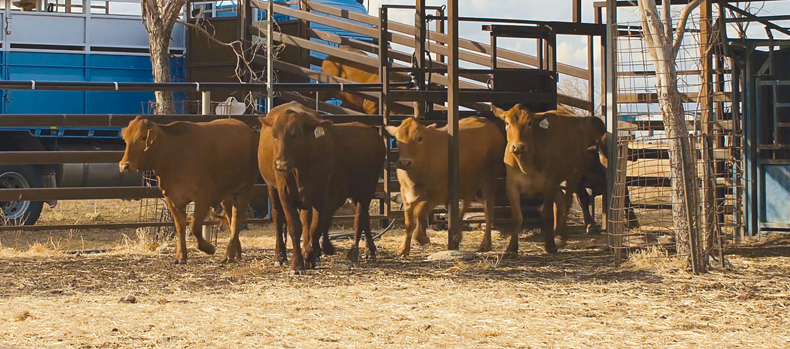Reduce trucking stress

Stress can have a detrimental effect on livestock; reducing meat quality, impacting milk production, ongoing animal health issues and low weight gains can all be caused by stress. In this article, we focus on limiting livestock stress during times of transport. Transporting of livestock between properties, to and from feedlots and to sale yards and abattoirs can negatively impact the animal’s health.
Stress indicators in livestock
Transportation and/or handling of livestock is a typical stressor, when livestock are under stress they often display common behaviours, such as:
- Bellowing/making noise
- Increased breathing rate
- Dehydration
- Reduced appetite
- Fight or flight – aggressive behaviour, or attempting to escape
Other stressors for livestock can include hunger, thirst, excessive heat or cold, handling, fear, injury or fatigue.
Increased stress leads to reduced productivity
The steroid hormone cortisol is released when livestock are stressed; the hormone supplies energy to the animal in the form of glucose. The cortisol release can be beneficial to the animal short term, yet in the long term, the animal can suffer negatively. Increased cortisol in the animal’s system can create a compromised immune system and thus increase the animals’ susceptibility to disease. Livestock immune systems can become suppressed due to stress.
According to the review article “The effect of stress on livestock and meat quality prior to and during slaughter’, Grandin (1980) writes:
“Long-term preslaughter stress, such as fighting, cold weather, fasting and transit, which occurs 12 to 48 hours prior to slaughter depletes muscle glycogen, resulting in meat which has a higher pH, darker colour and is drier. Short-term acute stress, such as excitement or fighting immediately prior to slaughter, produced lactic acid from the breakdown of glycogen. This results in meat which has lower pH, lighter colour, reduced water binding capacity, and is possibly tougher. Psychological stressors, such as excitement and fighting, will often have more detrimental effect on meat quality than physical stressors, such as fasting or cold weather.”
The long-term effects of stress can severely decrease the earning capacity of a producer. Reduced fertility and survival rates, lower milk-yields, decreased weight gains, reduced wool cut and tensile strength, increased sickness and overall poorer health can be caused by excessive stress.
A calmer animal performs better
Naturally calming livestock before and during key stress periods, especially transport, will aid in decreased shrinkage and less emptying-out on the truck. A calmer animal travels better and, as per Temple Grandin’s notes above, ultimately provides better meat quality.
Jenny Underwood – the owner of Eversleigh Station, Queensland, writes about their experience with Beachport Liquid Minerals when transporting cattle:
“When the time comes to move cattle, we are always mindful of their welfare leading up to, during, and after the loading and trucking process. In the paddocks, we ensure that all cattle receive plenty of feed and access to good, clean water. Supplements are fed when the protein levels in the grass are lacking or inadequate and water troughs are cleaned regularly. These practices guarantee that any cattle to be sent on trucks are strong and healthy.
One way of delivering supplementation is through water medication. Every six weeks we use Beachport Liquid Minerals which provides a mix of trace elements and nutrients in the water. We also use Beachport Liquid Minerals prior to trucking cattle as we have found it has a positive effect in reducing the stress levels associated with the loading and moving of cattle on trucks.”
At Beachport Liquid Minerals we are focused on improving the health of livestock for Australian producers. Our Green Cap product has been calming animals for transport and weaning throughout Australia for over 12 years. Beachport Liquid Minerals products have been created by a primary producer with livestock health and productivity being the focus.
To minimise the stress of animals, and reduce any risk to their welfare, the Australian Animal Welfare Standards and Guidelines for transportation can be found here.
Written by Tammy Flier & Kate Fairlie
Grandin, T. (1980). The effect of stress on livestock and meat quality prior to and during slaughter. International Journal for the Study of Animal Problems, 1 (5), 313-337.
